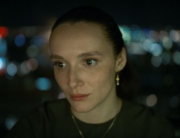Days making backroom deals and coke-fueled, brawl-filled nights are par for the course for Michael Logan—and he’s supposed to be one of the good guys. A corrupt cop on the mean streets of London, Logan is guided by a fractured sense of honor. After a good friend and drug trafficker with whom he’s just worked out an agreement is brutally murdered, he decides to discover who’s behind the killing and reestablish his place in the criminal underground.
This means negotiating with Albanians Nikolla and Rezar Kabashi (Orli Shuka and Gjevat Kelmendi, respectively), two grim and hard-as-nails crime lords who maim and kill with machinelike efficiency. Complicating matters is Logan’s recent appointment to a new drug trafficking task force whose goal is to take down the Kabashis. What’s this bad lieutenant to do? Forge on, of course, while making sure neither side knows his true intentions.
This is a well-plotted film, with enough action and thrills to keep most viewers from glancing at their watches. However, no new ground is broken here. The villains are fairly one note, and Logan is a typical antihero, and actor Peter Ferdinando walks the line, retaining just enough sympathy to make the obligatory redemption seem believable. And right on schedule, it’s a damsel in distress that places Logan on the road to salvation. Ariana (Elisa Lasowski) plays a young Eastern European woman working for the Kabashis, living with the constant threat of death and injury—to herself or her family—if she attempts to leave. Predictably, her plight gets to Logan, adding yet another variable to the increasingly fraught and perilous situation.
Some of the acting is on the unpolished side, though Stephen Graham (Boardwalk Empire’s Al Capone) stands out for his portrayal of David Knight, head of the drug trafficking task force; he dominates his scenes and acts as a strong counterpoint to Ferdinando’s more weary depiction.
It’s not always clear whose side Logan is truly on or what his real goals are—the double-crossing is almost dizzying at times. Audiences may be confused—indeed, Logan himself likely is—yet somehow the chaotic approach works, adding an intriguing layer to a fairly familiar story. With most of the characters on both sides of the law either straight up bad guys or genial screw ups (Logan’s lovably dissolute buddies and henchmen do a great job channeling Nick Frost), Logan’s also marked as a good guy by default, and we find ourselves rooting for him because there’s no alternative.
Visually, this is a stark film, devoid of the pithy dialogue or arch one-liners of a Quentin Tarantino or Guy Ritchie film. While there’s plenty of violence, it’s never stylized or romanticized. A scene where an unconscious Ariana is raped, by a man whom the Kabashis sold her to, is portrayed dispassionately, the cold tone making the moment all the more horrifying. This approach extends to the lighting as well: the bulk of the film is dominated by the gray-tinged light of day. By morning, the grimy hole-in-the-wall apartments and nightclubs aren’t glamorously sleazy—they’re plain seedy. Logan leads a fairly joyless existence; he’s a man for whom drug use and violence have become depressingly mundane.
For the most part, Hyena is rote. The one thing that will have audiences remembering it years from now is its ending. Director Gerard Johnson takes a cue from Sopranos creator David Chase, making a bold choice that will have some viewers groaning and others intrigued. It’s not quite enough to truly distinguish the movie, but it should make for some post-film discussion.

















Leave A Comment